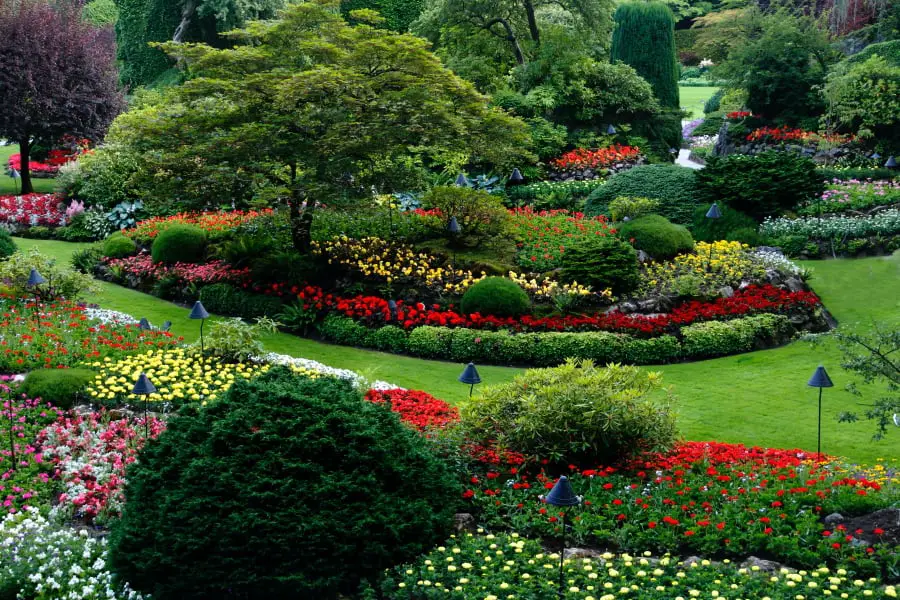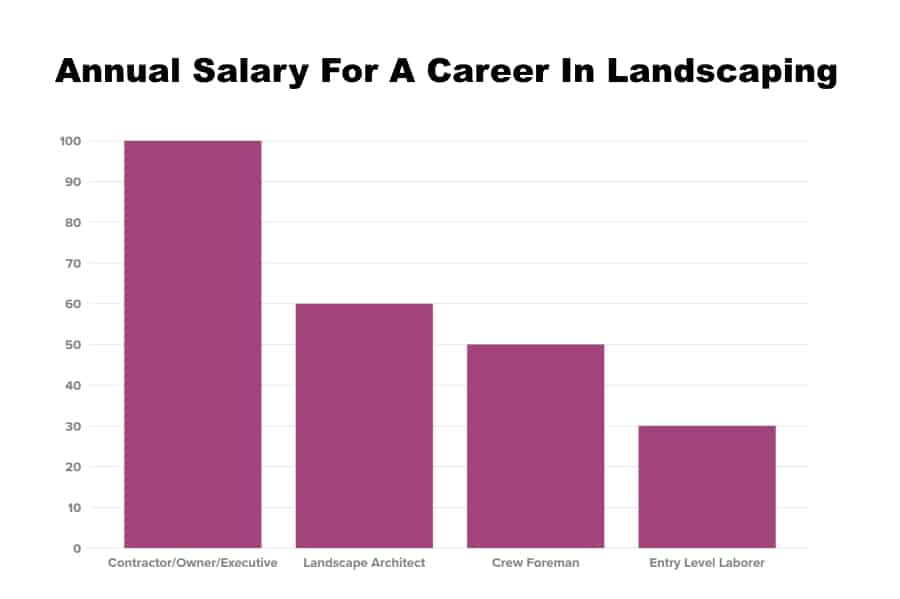The art (yes, art) of landscaping has, believe it or not, existed for hundreds and even thousands of years across several continents. Over that period, the profession has evolved from being a laborious chore for the indentured to the exciting and, oftentimes, highly rewarding activity it is today.
Landscaping is both a hard job and a good career. For those looking for a creative outlet that also allows for working with the hands, this type of work can be extremely rewarding. There are those that may not find landscaping motivating, but most can find a position in this wide ranging field.
While we all know a few gardeners or crews who make landscaping look easy, we should all be aware that looks can be deceiving. Just how difficult is this profession? Can anyone become a landscaper? Is there a landscaping school?
Let’s find out, shall we?

Contents
Is Landscaping A Hard Job?
It is safe to say that any job can be “hard”, depending on the degree of task difficulty as well as one’s attitude to the work. Landscaping is no different, and various factors contribute to the profession’s level of difficulty. Simply looking at the physical labor aspect, is landscaping hard?
Landscaping is a hard job on several levels, but its rewards can make the effort worth it. The physical side can be taxing, especially for the less physically fit. Yet, there are design, accounting, and other business facets to this line of work that can offset or even replace the physical.
Let’s start by looking at some of the general tasks of a landscaper.
According to American employment hub Indeed.com, a landscaper’s job involves “envisioning unique outdoor spaces and working with other landscape professionals to turn their visions into public parks and gardens for people to enjoy”.
Simple enough?
Also referred to as “landscape designers” or the classic “gardeners”, landscapers are employed by homeowners, companies, schools, hospitals, governments…and anyone else with an outdoor space that can be spruced up.
Landscapers may be employed either full-time or part-time and they may work individually or as a collective in the form of a landscaping company.
Landscape work falls into two categories: soft landscaping aka “softscape” and hard landscaping aka “hardscape”.
Softscape Landscaping
Softscape is the development and management of a landscape’s living elements. This includes lawns, trees, flowers, shrubs, and so forth. Softscape tasks involve watering plants, lawn mowing and edging, mulching, raking, pruning, planting, application of fertilizers and herbicides, and much more.
Softscape is arguably what the average person thinks about when they hear the term landscaping. These are typically the more day-to-day activities of the job since plants and grass require constant attention to keep them alive and healthy.
Hardscape Landscaping
Hardscaping is concerned with the non-living aspects of a landscape. Hardscape primarily deals with the design and/or management of things like fountains, fences, trees, garden ornaments, furniture, driveways, footpaths, signs, etc. While some of these elements may require the occasional touchup or paint job, hardscaping is rarely an everyday chore once features are installed.
Landscaping Job Difficulty
The degree of difficulty for both softscape and hardscape work largely depends on the scale of the job at hand. It is much easier to maintain a well-kept yard than it is to reel in one that has been allowed to turn into a jungle.
Also, as you would suspect, managing a golf course is a greater challenge than mowing a standard one-acre suburban yard.
Another factor that influences landscaping difficulty is the number of landscapers working in collaboration. Four hands are typically better than two, and the greater the number of people working on a project, the faster it gets completed. Working as a collective allows for splitting and delegation of tasks, something your lone landscaper simply cannot do.
Tools are a landscaper’s best friend, and their availability (and reliability) plays a major role in determining the difficulty of tasks. A self-propelled lawnmower, for instance, is a much more efficient tool for cutting grass than a manual reel mower.
Work hours and conditions are other things to consider. Landscaping is a largely outdoor activity so the conditions can drastically affect how hard it is. Long 8+ hour de-weeding shifts in Arizona sunshine, for example, are a hard experience for anybody.
How Hard Is Landscaping?
Landscaping has the potential to be a very demanding job depending on:
- The hours
The hours of work each day during the ‘busy season’ (i.e. Spring through Fall) can be quite a lot. During mowing, planting, and design implementation the heat is usually an issue, but due to downtime in the colder months long days can be required. Working from dawn till dusk is a common experience during dry and sunny days.
- Number of tasks/scale of the job
Here we can imagine that a large soft and hardscaping job for an office complex will be much different than a 1/4 acre job in a residential neighborhood. Some of the differences will be the size and scale, but other issues may be the level of detail required.
- Availability of tools
Tools can simply make or break a job. If you are using manpower to lift boulders, injuries and exhaustion can be close behind. Yet, if someone shows up with a forklift or frontend loader, the job gets exponentially easier. Easier also means that more work gets done and wages can slowly increase.
- Level of collaboration
Working with one man or small crews can be economically efficient on smaller jobs. If a long list of these smaller jobs are the goal then these crews are all that is needed.
Yet, if you are attempting to get larger contracts, small crews are a hinderance to both the employees’ health and ultimately the bottom line. The more hands on deck, the faster and less taxing the job is. That translates into more jobs per week, more revenue for the company as a whole, which can lead to higher salaries.
- Working conditions
Working in extreme temperatures, steep slopes, or wet conditions makes every landscaping job much more difficult. Though there are types of clothing, a rotation of works hours, and equipment to combat it, there is no getting around the negative effects of some environments on job satisfaction.
There is no getting around it, though working outside has its benefits, it comes with some definite issues.
If you would like to learn more about landscaping and lawn care, I recommend my other articles…
- How Long To Mow An Acre And What Mower Size Is Best?
- Are Leaf Blowers Worth It? Lawn Care Experts Weigh In
- Is A Leaf Blower Silencer A Thing? (Revealed)
How Long Does It Take To Learn To Landscape?
As we’ve already suggested in the introduction, landscaping is arguably an art.
Landscaping can take a lifetime to perfect, but the basics can be learned in a couple of years. Entry level positions are on-the-job training style environments, contractors or business owners should have many years of experience, and landscape architects need college degrees and certification.
This begs the question: can one ever learn the art to its fullest?
Perhaps not, but there are always basics you can master. Things like seeding, fertilization techniques, and flowering seasons can be learned. However, producing landscaping masterpieces requires knowledge of the basics and artistic ability to envision the best way of exploiting a particular environment…and that may take a lifetime.
If you are looking for an immediate timeline, we recommend that you register for an apprenticeship with a landscaping company or observe landscapers in your area or online.
As far as qualifications, you rarely need any for most entry-level positions, provided you can prove that you can do the job. That said, if you have aspirations of going far with the profession or even starting your own landscaping business, a degree or diploma in landscaping or horticulture wouldn’t hurt. Obtaining these certifications can take between 2-4 years.
Numerous universities and colleges across the U.S. offer qualifications related to landscaping, with several of them being accredited by the National Association of Landscape Professionals.
What Skills Do You Need To Be A Landscaper?
Landscaping is unique because it often involves aspects of other fields. Seasoned landscapers may have advanced knowledge of geography, botany, biochemistry, architecture, and even history!
There are several skills and qualities that are necessary for one to become a top-shelf landscaper. These include (but are not limited to):
- Work ethic
- Passion for landscape design
- Knowledge of plant biology and maintenance
- Attention to detail
- Balanced knowledge of softscape and hardscape
- Soil management
- Irrigation management
- Power tool expertise or certification
- Improvisation
- Ability to envision and communicate vision effectively
- Landscaping certification
- Equipment maintenance and repair skills
- Awareness and observation of safety protocols
- Realistic target setting
Is Landscaping A Good Job?
We have discussed some of the challenges that face landscapers both part-time and full time workers. Yet, Does that mean that it is not a good job?
Landscaping is a good job for the right person, with the right skill set and personality. Physical labor is not for everyone, but not all parts of landscaping are physical in nature. It can be a good career for both the artistic minded and those leaning toward physical labor.
The landscaping business is one that allows learning on the job, and one to take that experience if so inclined and to start their own. There are also possibilities of those with architecture degrees and business degrees to thrive and grow businesses on a very large scale.
There are well known and not so well known landscapers and lawn care companies that work on multi-million dollar budgets every year. The field has a place for all skill sets and can accommodate many levels of ambition.
Is Landscaping A Bad Job?
As we discussed earlier, the perception of a job as “good” may be influenced by one’s attitude towards it.
For those that do not enjoy working with their hands, getting dirty, or creative design, Landscaping can be a bad job choice. Landscaping is an amazing job, both for the men and women who get enjoyment from turning ideas into reality and doing some manual labor.
For a lot of people though (perhaps even you), it’s usually about the money…and understandably so.

The average salary range for American landscaping contractors is anywhere between $30,000-$120,000 per year. The average wage in the landscaping industry is about $18.15 per hour.
Entry-level crew workers can earn around $15 per hour, which translates to about $30,000 a year.
Foremen and line supervisors earn more at around $24 an hour, which is nearly $50,000 per annum.
Landscape architects, who are responsible for a lot of hardscape designs, can rake in more than $60,000.
Operations managers and top-level executives usually earn the most at $90,000-$120,000 a year.
Finances aside, some people truly have an artistic, leave-a-stable-office-job-behind affinity for landscaping. Whether it’s the love of the great outdoors, the serenity of hard work, among other reasons, lots of people find fulfillment through this noble profession.
Landscaping can be a bad job for some, but an excellent job for others.
The Final Touches On Landscaping Being A Hard Job Or Good Career…
Landscaping can be a great career for many people from all walks of life. Some parts of the job require accounting skills, some design skills, and others a tenacious work ethic and strong back.
There is a position in landscaping and even lawn care for just about any personality or body type.
With that said, some people will simply not find it as rewarding as others. As with all career options, the tasks required will be repeated so often that it is necessary for someone to at least have some interest in the occupation.
For the right person, not only will the job be enjoyable, but it can be a good way to provide for families and retirement.
If you liked this article, you will like my others here…
- How Long To Mow An Acre And What Mower Size Is Best?
- Are Leaf Blowers Worth It? Lawn Care Experts Weigh In
- Is A Leaf Blower Silencer A Thing? (Revealed)
References
